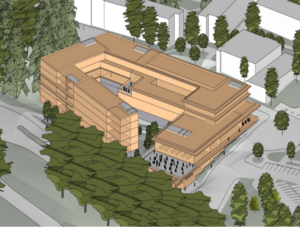Project delivery methods have been debated for years. Which one is best? Which is most efficient? Which reduces risk? Which delivers a project the quickest? Some argue that infrastructure projects are delivered faster and with greater cost-effectiveness when the design-build method of delivery is used. Others disagree.
The design-build model of collaborative engagement accelerates project timelines by consolidating the design and construction phases of the project and that speeds up the process. It also allows some projects to begin before environmental review processes are completed. Another federal rule change made the delivery method even more attractive by allowing design-build contracts to receive a larger share of federal funding.
In the last several years, the design-build method of delivery has gained traction because of greater support from new programs such as the Infrastructure Investment and Jobs Act (IIJA), the American Rescue Plan Act (ARPA) and the Inflation Reduction Act (IRA). A study released in 2021 forecasted an expected 34% increase in design-build spending by 2025. Now, some states are making it easier for state environmental agencies to fast-track projects using the design-build program. Some of the upcoming projects outlined in this article are indicative of what can be expected in the next several years.
A $175 million student housing, health and dining building on the Cal Poly Humboldt campus in Arcata, Calif., will be delivered through a design-build contract. Because of a nationwide housing shortage, there is a need to address the mounting housing demand quickly. The project will bring an additional 200,000 square feet of student housing, health and dining space to the state polytechnic university campus. It will create 650 new beds for student housing and deliver a new parking facility. The project will begin the design-build procurement phase in the spring of 2023.
A South Carolina infrastructure project to replace Interstate 95 bridges over Lake Marion in South Carolina has been given a projected cost of approximately $331.5 million and it will also be delivered by a design-build engagement. The state’s Department of Transportation wants to accelerate the bridge replacement projects because of the need to form a critical connection between the counties of Clarendon and Orangeburg. Despite being constructed in 1968, the bridges currently support an average of 38,900 vehicles per day. State officials have requested approximately $160 million in federal funding for a portion of the total anticipated cost to replace the bridges.
A $982 million North Houston Highway Improvement Project will be launched in 2024. The Texas Department of Transportation (TxDOT) is supporting a faster delivery method for repair projects through the agency’s Alternative Delivery Division. In 2022, TxDOT released a forecast document that outlined planned design-build projects over the next seven years and the cumulative cost amounts to several billions of dollars in roadway repairs. A Memorandum of Understanding has been signed and this project will kickstart roadway repairs at interchanges at I-45 and I-10 in Houston.
The Colorado Department of Transportation (CODOT) published its monthly update to project bid lettings and the document highlighted the role that design-build will play in the state’s immediate future. The recent procurement forecast suggests that CODOT plans to advertise a modified design-build contract for bids on March 31, 2023. It involves the extension of a multi-use trail adjacent to US Highway 6. The trail extension will also require rehabilitation of four existing bridges. CODOT has yet to attach a price tag to the project, but a similarly scoped segment of the trail recently entered construction with a $30 million budget.
design-build will be the type of engagement contract the Bryan County, Ga., project will use to launch a $150 million project. The state’s Department of Transportation’s Office of Alternative Delivery is programming a slate of design-build projects to dovetail with work that has already begun on a mega-site development in Bryan County. The design-build approach will fast-track accessibility improvements around the proposed mega-site, ensuring they are delivered in time to facilitate the area’s expected increase in traffic. One project in the DOT’s design-build pipeline is a $150 million interchange improvement that involves an interchange at Interstate 16 and Old Cuyler Road. The project will directly link interstate traffic to the mega-site development.
Miami-Dade County will be the site of a $14 million effort designed to install wrong-way driving technology at ramp locations. Implementation of technology enhancements will be divided across two phases and the design-build delivery method will allow the Florida Department of Transportation to accelerate their deployment. Included will be notification system that warns against wrong-way driving while also alerting surrounding drivers and nearby law enforcement when instances of it occur.
In South Carolina, a new design-build initiative will expedite the timelines of several other costly, corridor-spanning projects. The state transportation department plans to use design-build delivery to carry out simultaneous repairs to multiple off-system bridges. Using design-build delivery, individual bridge repair projects will be bundled into a single contract, which will be awarded in 2023. The $30 million alternative delivery project will streamline the replacement of traditionally overlooked bridges in an expedited timeline and will help state officials capitalize on the surge in federal infrastructure funding.
Project delivery models will be debated continually but design-build initiatives are receiving lots of attention at this time.
________________________________________________________________________
 Mary Scott Nabers is President/CEO of Strategic Partnerships, Inc. (SPI), a full-service business development firm specializing in procurement consulting, government affairs, research and public-private partnerships (P3s). A former statewide office holder in Texas, Mary founded Strategic Partnerships, Inc after leaving government and later was the co-founder of the Gemini Global Group .
Mary Scott Nabers is President/CEO of Strategic Partnerships, Inc. (SPI), a full-service business development firm specializing in procurement consulting, government affairs, research and public-private partnerships (P3s). A former statewide office holder in Texas, Mary founded Strategic Partnerships, Inc after leaving government and later was the co-founder of the Gemini Global Group .
Mary is a recognized expert in public private partnerships and the author of Collaboration Nation – How Public-Private Ventures Are Revolutionizing the Business of Government and her most recent book Inside the Infrastructure Revolution – A Roadmap for Rebuilding America. She was selected to membership in Icons of Infrastructure and is a regular speaker at industry conferences throughout the country. She writes for a number of national publications and blogs on a weekly basis.
Mary holds an MBA degree from The University of Texas.
For more information – www.spartnerships.com and www.maryscottnabers.com







 RSS Feed
RSS Feed